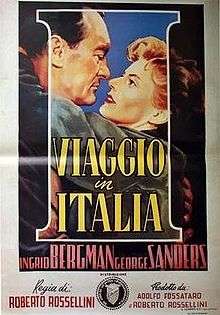Journey to Italy
| Journey to Italy | |
|---|---|
 Theatrical release poster | |
| Directed by | Roberto Rossellini |
| Produced by |
Adolfo Fossataro Alfredo Guarini Roberto Rossellini |
| Written by |
Vitaliano Brancati Roberto Rossellini |
| Based on |
Duo by Colette |
| Starring |
Ingrid Bergman George Sanders |
| Music by | Renzo Rossellini |
| Cinematography | Enzo Serafin |
| Edited by | Jolanda Benvenuti |
| Distributed by | Titanus Distribuzione |
Release dates |
|
Running time |
97 minutes (U.S.) 85 minutes (Italy) |
| Country |
Italy France |
| Language | English |
Journey to Italy, also known as Voyage to Italy[1][2] (Italian: Viaggio in Italia) is a 1954 Italian drama film directed by Roberto Rossellini and starring Ingrid Bergman and George Sanders. The film has English dialogue; the Italian version was originally cut. It is loosely based on the novel Duo by Colette.
Journey to Italy is considered by many to be Rossellini's finest work.[3]
Plot
Alex and Katherine Joyce (Sanders and Bergman) are a couple from England who have traveled to Italy to sell a large property near Naples that they have recently inherited. Alex is a workaholic businessman, given to brusqueness and sarcasm. Katherine is more sensitive, and the journey has evoked poignant memories of a poet friend, Charles Lewington, now deceased.
Within days of their arrival, the couple's relationship starts to disintegrate amid mutual misunderstandings and a degree of jealousy on both sides. Things become so strained that they agree to divorce, but following a visit to Pompeii, they get caught up in a religious procession in Naples that - as it seems, miraculously — rekindles their love for each other.
Cast
- Ingrid Bergman as Katherine Joyce
- George Sanders as Alexander 'Alex' Joyce (credited as Georges Sanders)
- Maria Mauban as Marie (credited as Marie Mauban)
- Anna Proclemer as the prostitute
- Paul Müller as Paul Dupont
- Leslie Daniels as Tony Burton (billed as Anthony La Penna)
- Natalia Ray as Natalie Burton (credited as Natalia Rai)
- Jackie Frost as Betty
Production
The film was originally intended as an adaptation of the French writer Colette's novel Duo; Rossellini was, however, unable to get the rights to the novel, and was forced to re-write the screenplay until it differed sufficiently from its original.[4]
Reception
Although Journey to Italy performed badly at the box office, French critics at the Cahiers du Cinéma (such as François Truffaut) showed early admiration for the work, proclaiming it to be the first modern film. Martin Scorsese talks about the film and his impressions of it in his own film My Voyage to Italy. George Sanders' autobiographical Memoirs of a Professional Cad (1960) tellingly describes Rossellini's haphazard methods of direction and their effects on the actors and production team.
Today, Journey to Italy is generally regarded as a masterpiece of world cinema; it is tied for 39th place in the British Film Institute's 2012 list of the greatest films ever made.
References
- ↑ Brunette, Peter (1996). Roberto Rossellini. University of California Press. p. 155. ISBN 978-0-520-20053-1.
- ↑ Lehman, Peter (1 January 1990). Close Viewings: An Anthology of New Film Criticism. University Press of Florida. p. 39. ISBN 978-0-8130-0967-4.
- ↑ "1,000 Greatest Films (Full List)". Retrieved January 27, 2016. "77. Voyage in Italy (Rossellini, 1953)"
- ↑ Brunette, Peter (1987). Roberto Rossellini. Berkeley, California: University of California Press. p. 156.
External links
| ||||||